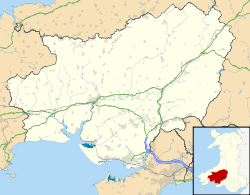Mynydd Pencarreg transmitting station
 | |
| Mast height | 99 metres (325 ft) |
|---|---|
| Coordinates | 52°04′03″N 4°04′36″W / 52.0675°N 4.0767°WCoordinates: 52°04′03″N 4°04′36″W / 52.0675°N 4.0767°W |
| Grid reference | SN577430 |
| Built | 1956 |
| Relay of | Carmel |
| BBC region | BBC Wales |
| ITV region | ITV Wales |
The Mynydd Pencarreg transmitting station is a broadcasting and telecommunications facility located on high ground about 10 km south of Lampeter, in Ceredigion, Wales. The site has a guyed 99 m (325 ft) lattice mast erected on land that is itself about 410 m (1,345 ft) above sea level. It was originally built by the GPO as a telecommunications relay, and (amongst other things) was responsible for handling the microwave feed carrying the now-defunct 405-line VHF BBC television service to the television transmitter at Blaenplwyf about 35 km to the northwest near Aberystwyth. Despite this, Mynydd Pencarreg was never a 405-line TV broadcast site.
Broadcast UHF television was added to the site in early 1981,[1] launching with just the three programme services that were active at the time. S4C was added in 1982 when it launched.
Currently, the transmitter provides DVB-T digital television to the Lampeter area, along with FM radio.
Services listed by frequency
Analogue television
Early 1981 - 1 November 1982
When 625-line colour television came to the area, the site became a relay of Preseli about 50 km to the southwest.
| Frequency | UHF | kW | Service |
|---|---|---|---|
| 767.25 MHz | 58 | 0.12 | BBC1 Wales |
| 791.25 MHz | 61 | 0.12 | HTV Wales |
| 815.25 MHz | 64 | 0.12 | BBC2 Wales |
1 November 1982 - 19 August 2009
Channel 4 was added to the set transmitted from the site when it launched in November 1982. Being in Wales, Mynydd Pencarreg radiated the S4C variant.
| Frequency | UHF | kW | Service |
|---|---|---|---|
| 735.25 MHz | 54 | 0.12 | S4C |
| 767.25 MHz | 58 | 0.12 | BBC1 Wales |
| 791.25 MHz | 61 | 0.12 | HTV Wales |
| 815.25 MHz | 64 | 0.12 | BBC2 Wales |
Analogue and digital television
19 August 2009 - 16 September 2009
The UK's digital switchover commenced, mirroring the changes taking place at the parent transmitter at Preseli. Analogue BBC Two Wales closed on channel 64 and ITV1 Wales took over on that frequency for what would be its final 3 weeks of service, vacating channel 61 as it did so. The new digital BBC A multiplex started up at full power in 64-QAM mode on channel 61.
| Frequency | UHF | kW | Service | System |
|---|---|---|---|---|
| 735.25 MHz | 54 | 0.12 | S4C | PAL System I |
| 767.25 MHz | 58 | 0.12 | BBC One Wales | PAL System I |
| 794.000 MHz | 61 | 0.024 | BBC A | DVB-T |
| 815.25 MHz | 64 | 0.12 | ITV1 Wales | PAL System I |
Digital television
16 September 2009 - 31 October 2012
All the analogue television services closed and the new digital multiplexes took over their frequencies.
| Frequency | UHF | kW | Operator |
|---|---|---|---|
| 738.000 MHz | 54 | 0.012 | BBC B |
| 770.000 MHz | 58 | 0.012 | Digital 3&4 |
| 794.000 MHz | 61 | 0.012 | BBC A |
31 October 2012 - present
OFCOM have announced that channel 61 is also to be cleared so as to make space for future 4G mobile phone services.[2] At Mynydd Pencarreg, BBC A was moved from channel 61 to channel 49.[3]
| Frequency | UHF | kW | Operator |
|---|---|---|---|
| 698.000 MHz | 49 | 0.012 | BBC A |
| 738.000 MHz | 54 | 0.012 | BBC B |
| 770.000 MHz | 58 | 0.012 | Digital 3&4 |
Analogue radio (FM VHF)
August 1981 - Late 1980s
FM radio from Mynydd Pencarreg launched in 1981,[4] initially with just the three services that were typical of the time. For radio, the site was an off-air relay of Blaenplwyf.
| Frequency | kW | Service |
|---|---|---|
| 89.7 MHz | 0.2 | BBC Radio 2 |
| 91.9 MHz | 0.2 | BBC Radio 3 |
| 94.1 MHz | 0.2 | BBC Radio Cymru |
Present
| Frequency | kW | Service |
|---|---|---|
| 89.7 MHz | 0.2 | BBC Radio 2 |
| 91.9 MHz | 0.2 | BBC Radio 3 |
| 94.1 MHz | 0.2 | BBC Radio Cymru |
| 96.6 MHz | 0.2 | Radio Ceredigion |
| 99.3 MHz | 0.2 | BBC Radio 1 |
| 103.7 MHz | 0.2 | BBC Radio 4 |
See also
- List of masts
- List of radio stations in the United Kingdom
- List of tallest buildings and structures in Great Britain